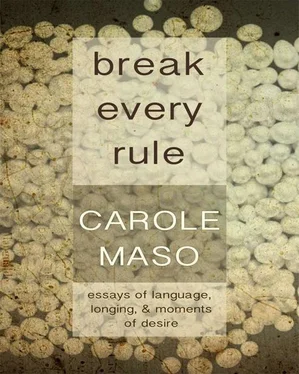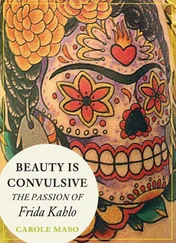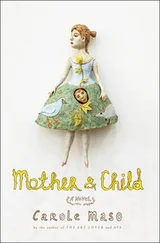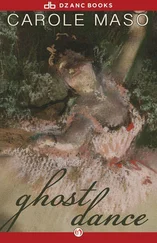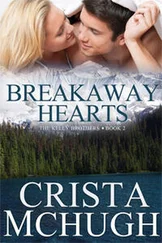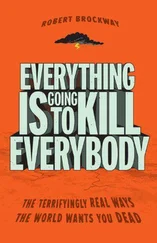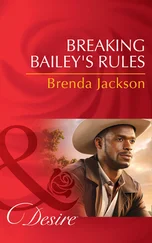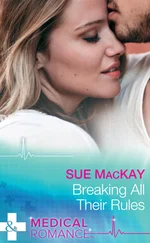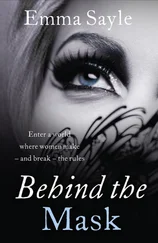This land of stark miracle springing from the extraordinarily fertile earth. Flat earth. Where each night on the flatlands I dream of a curvaceous woman. She cups water in her hands. And I marvel at the beauty of the cornfields and the sky. Count pheasants. Visit what I’ve dubbed the Beckett tree, straight out of Godot . The land is breathtaking in its austerity, in its uncompromising forever, as gorgeous as anything I’ve ever seen. A different sort of ocean.
But I fear at times the cornfields and the miles and miles of soybean fields and the sky. We are up to our thighs in corn. We imagine we drink utterly pure, sweet water. Heartland water. Perfect water. But three younger women now, natives of this place, all from the heart of the heart of the country, are stricken with cancer, and I am forced to wonder what it is about. The pesticides in the sweet water? The beloved injected cows, that delicious, coveted beef? The feed?
This pristine countryside. We drive. I take my class hours and hours away to another school to see the great filmmaker Stan Brackhage, who has turned up to speak and show films. We are examining alternative narrative strategies in my graduate class. Hearing him speak and watching his extraordinary films in the dark, I forget for a few hours how far away I am from home. For a little while I am more at home than I am anywhere else.
I was expecting nothing. Then, after a while I was expecting an extreme provinciality from my central Illinois. But finally I have come to realize that it is no more provincial than one of the minor cities: Pittsburgh or Milwaukee, say. And, in fact, it may be somewhat better, who knows? I joined the Normal ACT UP, a branch that included maybe ten people. One freezing October night we read the names of those who had died all the way through until dawn, and there was a legion of people here to grieve all ages, all types. All night.
And of Chicago, I recognize immediately that it is a city I might, given the chance, come to love. I find myself more comfortable there than in any other American city I know outside of New York. It seems real — its architecture, its grandeur, its people, its cultural life, its miseries. I find it a relief after the pretty toy of San Francisco, the segregated contrivances of Boston, artificial D.C., sprawling, incomprehensible L.A. And the other cities: Houston, Atlanta, whatever. Who knew?
And in retrospect ISU will be among the best institutions I shall teach in. Schools that now include Columbia, Bennington, Brown.
And it is the first time I will ever be called a goddess. And it is the first time in my adult life that I will be able to pay my bills. Or go to the doctor.
The goddess is waiting again, having gone home to New York and having flown back to Chicago, for her all-too-small, all-too-private plane to take her back to Bloomington. I look for the dark angel I see each time in the propeller’s rotating blade. So many hair-raising American Eagle trips that year, flights I was pretty sure I’d never get off alive. They were always cartoonish, it seemed, with drinks flying and ladies crying. Before boarding they would check our weight and the weight of our carry-ons, in order to assign seats. So much waiting that year. The wings are frozen solid again. I entertain the grim possibility that perhaps at last this will be my final flight.
There are many strange dangers. I have always feared the Midwest, I realize that now — known for its clean-cut serial killers, its smoldering, unreadable violences. When I walk into my friendly, neighborhood liquor store I literally see red before my eyes. Sometimes it’s only for an instant, but sometimes it’s something more prolonged. It’s odd because I do not ordinarily have such visions, and yet the color is undeniable — red. Only much later do I learn of the triple murder that occurred there a year or so before. OK, maybe I, too, have come to die. I can’t help wondering.
Or maybe I’ve come here just to dance: We pile into the truck in our glitter and bows and head for Peoria to the local gay club to watch our friend perform in drag. I am a little smug. I am of course from New York City, and dubious to say the least. In my time I have witnessed more than one cross-dressers’ convention in Provincetown, that gay mecca, and I fancy myself something of an expert.
Peoria, Illinois. The audience in this grungy club is the weirdest mix: lots of working people, farmers and the like, their wives, businessman types, young lesbians, and gay men of all ages. I have never seen such a sight. Our friend appears center stage. It is he who is the goddess, with those cat eyes, those cheekbones, that perfect jaw, that smile. His hair is fabulous, his makeup is fabulous, his dress. He, or rather, she, is more amazing than anything I’ve seen, and she’s just my type, too: a young, kind of decadent Bianca Jagger. She bends her knees, blows kisses, does a little turn. And the music begins. I wonder what the French would think. Nothing here is ever quite what it seems. And I must admit I am a little bit in love.
Precious, Disappearing Things
AVA IS LIVING TEXT. One that trembles and shudders. One that yearns. It is filled with ephemeral thoughts, incomplete gestures, revisions, recurrences, and repetitions — precious, disappearing things. My most spacious form thus far, it allows in the most joy, the most desire, the most regret. Embraces the most uncertainty. It has given me the freedom to pose difficult questions and has taught me how to love the questions: the enduring mystery that is music, the pull and drag of the tide, the mystery of why we are here and must die.
No other book eludes me like AVA . It reaches for things just outside the grasp of my mind, my body, the grasp of my imagination. It brings me up close to the limits of my own comprehension, pointing out, as Kafka says, the incompleteness of any life — not because it is too short, but because it is a human life. AVA is a work in progress and will always be a work in progress. It is a book in a perpetual state of becoming. It cannot be stabilized or fixed. It can never be finished. It’s a book that could be written forever, added to or subtracted from in a kind of Borgesian infinity. Do I ever finish putting things in order? Can I assign a beginning to affection, or an end? Every love affair returns, at odd moments, as a refrain, a handful of words, a thrumming at the temple perhaps, or a small ache at the back of the knee. AVA is filled with late last-minute things — postscripts, post-postscripts.
I come back to writing continually humbled and astonished. I do not pretend to understand how disparate sentences and sentence fragments that allow in a large field of voices and subjects, linked to each other quite often by mismatched syntax and surrounded by space for 265 pages, can yield new sorts of meanings and wholeness. I do not completely understand how such fragile, tenuous, mortal connections can suggest a kind of forever. How one thousand Chinese murdered in a square turn into one thousand love letters in the dying Ava Klein’s abstracting mind, or how the delicate, coveted butterflies Nabokov chases on the hills of Telluride become a hovering and beautiful alphabet. I cannot really speak of these things. As Michael Palmer said of one of his volumes of poetry, “the mystery remains in the book.” I can only discuss the writing of AVA
I was promoting my novel The Art Lover . I was flying places, meeting people, connections were constantly being made and broken. I felt strange and estranged the way I do during such times, with all the reading, all the talking into black microphones, all the usual replies to the same questions over and over. Because I must write every day, I continued to write then, though I could only manage one or two sentences at a time. The next entry, some time later, would be another sentence, often unrelated to the one that had come before. I was using language as an anchor and a consolation, enjoying the act of simply putting one word next to another and allowing them to vibrate together. Most days it was my only pleasure. Shortly after the book promotion, North Point Press, scheduled to do my next book, The American Woman in the Chinese Hat , and also The Art Lover in paperback, folded. These books made the rounds at commercial houses where so-called literary editors displayed the usual ignorance and lack of vision I have now become more accustomed to, with their love of safety and product and money. But I was still capable of being shocked by them then. I kept writing in pieces. I was scheduled to escape to France and had sublet my apartment when a death prevented me from leaving the country. The fragments piled up. Keeping the notebooks going, I began to travel the world in my own way. Among the many voices I had accumulated I began to hear a recurring voice, an intelligence if you will. She was a thirty-nine-year-old woman, confined to a hospital bed and dying, yet extraordinarily free.
Читать дальше
